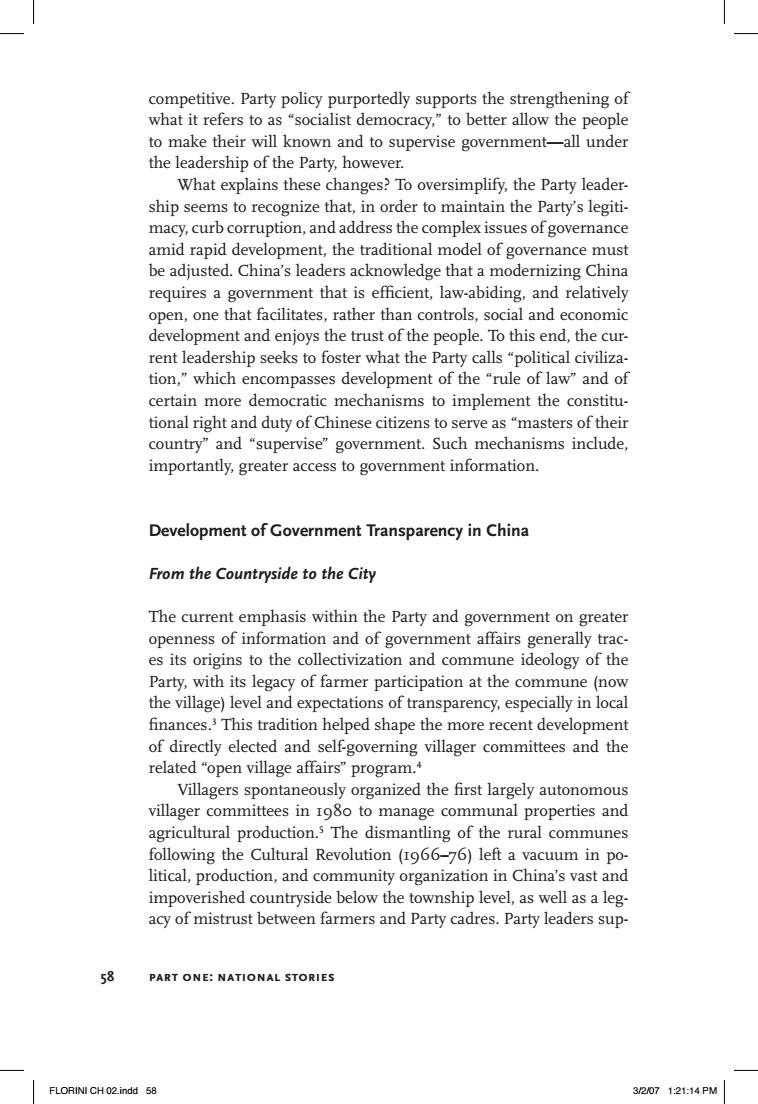正在加载图片...

competitive.Party policy purportedly supports the strengthening of what it refers to as "socialist democracy,"to better allow the people to make their will known and to supervise government-all under the leadership of the Party,however. What explains these changes?To oversimplify,the Party leader- ship seems to recognize that,in order to maintain the Party's legiti- macy,curb corruption,and address the complex issues of governance amid rapid development,the traditional model of governance must be adjusted.China's leaders acknowledge that a modernizing China requires a government that is efficient,law-abiding,and relatively open,one that facilitates,rather than controls,social and economic development and enjoys the trust of the people.To this end,the cur- rent leadership seeks to foster what the Party calls "political civiliza- tion,"which encompasses development of the "rule of law"and of certain more democratic mechanisms to implement the constitu- tional right and duty of Chinese citizens to serve as"masters of their country"and "supervise"government.Such mechanisms include, importantly,greater access to government information Development of Government Transparency in China From the Countryside to the City The current emphasis within the Party and government on greater openness of information and of government affairs generally trac- es its origins to the collectivization and commune ideology of the Party,with its legacy of farmer participation at the commune(now the village)level and expectations of transparency,especially in local finances.3 This tradition helped shape the more recent development of directly elected and selfgoverning villager committees and the related“open village affairs”program. Villagers spontaneously organized the first largely autonomous villager committees in I98o to manage communal properties and agricultural production.s The dismantling of the rural communes following the Cultural Revolution (1966-76)left a vacuum in po- litical,production,and community organization in China's vast and impoverished countryside below the township level,as well as a leg- acy of mistrust between farmers and Party cadres.Party leaders sup- 58 PART ONE:NATIONAL STORIES FLORINI CH02indd 58 3/2071:21:14PM58 part one: national stories competitive. Party policy purportedly supports the strengthening of what it refers to as “socialist democracy,” to better allow the people to make their will known and to supervise government—all under the leadership of the Party, however. What explains these changes? To oversimplify, the Party leadership seems to recognize that, in order to maintain the Party’s legitimacy, curb corruption, and address the complex issues of governance amid rapid development, the traditional model of governance must be adjusted. China’s leaders acknowledge that a modernizing China requires a government that is efficient, law-abiding, and relatively open, one that facilitates, rather than controls, social and economic development and enjoys the trust of the people. To this end, the current leadership seeks to foster what the Party calls “political civilization,” which encompasses development of the “rule of law” and of certain more democratic mechanisms to implement the constitutional right and duty of Chinese citizens to serve as “masters of their country” and “supervise” government. Such mechanisms include, importantly, greater access to government information. Development of Government Transparency in China From the Countryside to the City The current emphasis within the Party and government on greater openness of information and of government affairs generally traces its origins to the collectivization and commune ideology of the Party, with its legacy of farmer participation at the commune (now the village) level and expectations of transparency, especially in local finances.3 This tradition helped shape the more recent development of directly elected and self-governing villager committees and the related “open village affairs” program.4 Villagers spontaneously organized the first largely autonomous villager committees in 1980 to manage communal properties and agricultural production.5 The dismantling of the rural communes following the Cultural Revolution (1966–76) left a vacuum in political, production, and community organization in China’s vast and impoverished countryside below the township level, as well as a legacy of mistrust between farmers and Party cadres. Party leaders supFLORINI CH 02.indd 58 3/2/07 1:21:14 PM